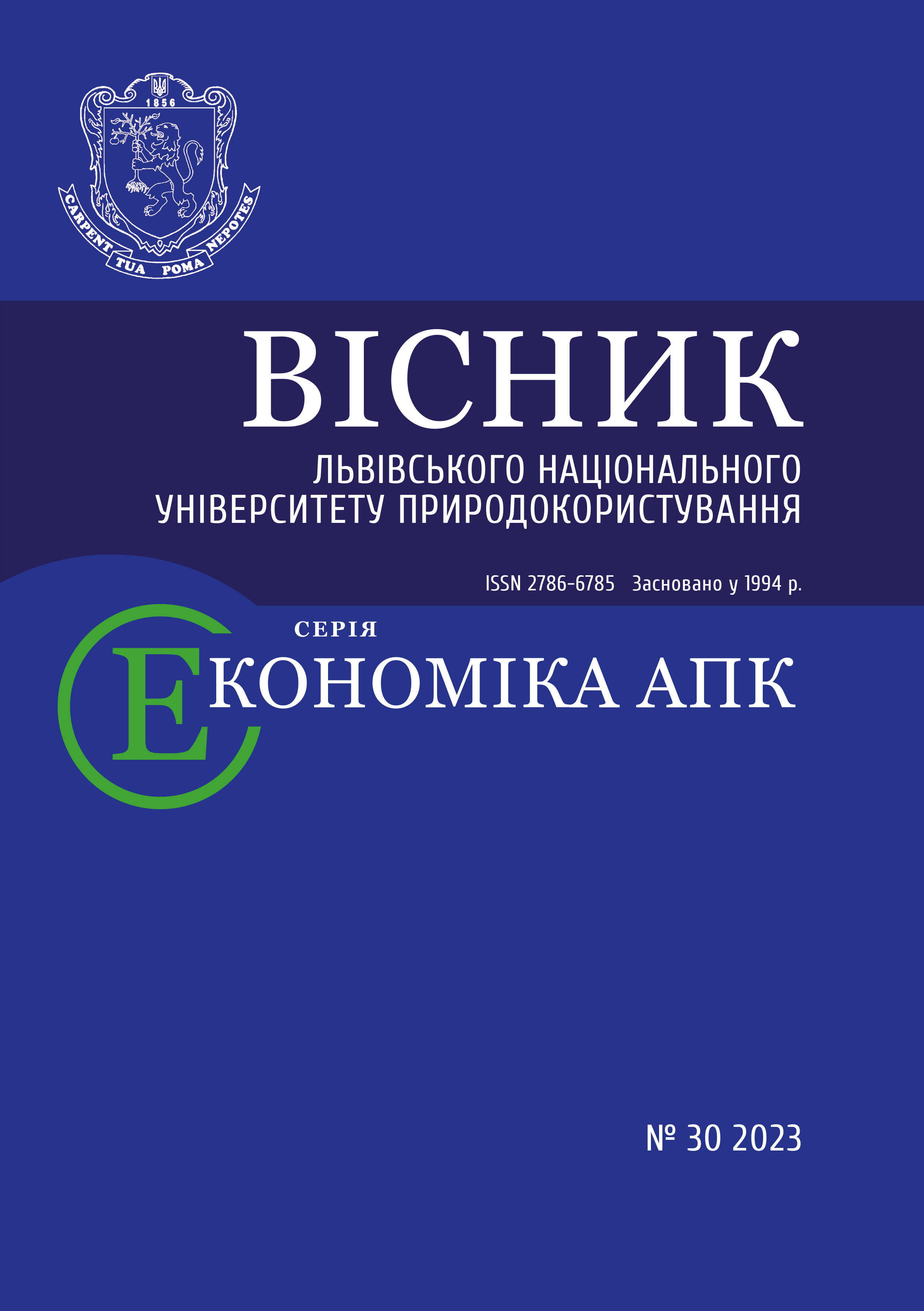HEALTH AS AN ELEMENT OF HUMAN CAPITAL AND A FACTOR OF ECONOMIC GROWTH
DOI:
https://doi.org/10.31734/economics2023.30.007Keywords:
health, human capital, economic growthAbstract
The purpose of this article is to present research results of the main approaches to interpreting the essence of human potential and health as its main element and factor of the functioning efficiency. The main task of the conducted research was to analyze, systematize and summarize available information on the essence and structure of human potential in the context of importance and role of health in it, and to present the obtained results in the form of conclusions that can be useful for different levels of power authorities and administrative economic bodies, especially for enterprises seeking to improve quality of their human potential as a basis for further economic growth. The methodology of the research conducted on the topic of this article is based on application of the principles of dialectical method of scientific research in the best possible combination with analysis and synthesis, induction and deduction, scientific abstraction, organic integrity of history and logic in economic researching by using monographic and descriptive methods, as well as methods of generalization, comparison, scientific predictions and forecasting. The main sources of information used in the course of the conducted research included materials of official information sources, publications of domestic and foreign scientists related to the identified research direction, and the results of authors’ personal observations. The research has clarified evolution of the concept and structure of the category of human capital and the place of health in it, as well as its impact on the level of population’s well-being, which is formed as a result of the combined effect of economic growth and health status. The scientific novelty of the results of the conducted research consists in the formed dependence, having the character of a circular closed cycle, between the level of health, the quality of human capital and economic growth. The most promising direction of the further research on the impact of health on economic growth due to the quality of human capital, and impact of economic growth on health may revealed in development of the methodology for determining the tightness of the mentioned relation at each link of the established chain of dependencies.
References
Białynicki-Birula P. The impact of health on the development of social well-being. e-GAP Economic Bulletin. 2007. 3. P. 1–5.
Bohashko O. L. Human capital and its role in ensuring innovative development of the national economy. Bulletin of Odessa National University. Series: Economy. 2014. 19, iss. 2. P. 32–35.
Buriachenko O. V. “Human capital” as a basis for forming reputation of a modern politician. 2017. URL: http://ir.lib.vntu.edu.ua /bitstream /handle/ 123456789/17625/1975.pdf?sequence. (Last accessed 26 May 2023).
Czerniak J. Innovation policy in Poland. Analysis and proposed directions of changes. Warsaw: Difin, 2013. 231 p.
Domanski St. R. Human capital and economic growth. Warsaw: SGPiS, 1990. 293 p.
Fägerlind, Ing. Formal education and adult earnings. Stockholm: Almqvist &Wicksell International, 1975. 104 p.
Gary Stanley Becker. 2017. URL: http://nobel.knute.edu.ua/ index.php/nobelivski-laureati/geri-stenli-bekker (Last accessed 3 June 2023).
Grossman M. On the Concept of Health Capital and the Demand for Health. Journal of Political Economy. 1972. 80(2). P. 223-255. doi: 10.1086/259880.
Hause J. C. Earnings profile: Ability and schooling. Journal of Political Economy. 1972. 80 (3/2). P.108–138.
Hnatyszyn-Dzikowska A., Łyszczarz B., Wyszkowska Z. The importance of public health for economic growth - a model approach. Economic situation and reactions of business entities. Scientific Papers, University of Economics in Katowice. 2009. P. 37–48.
Hrishnova O. A. Human capital: formation in the system of education and professional training. Kyiv: Znannia, KOO, 2001. 254 p.
Human capital. 2020. URL: https://mfiles.pl/pl/index.php/ Kapita% C5%82_ludzy (Last accessed 12 June 2023).
Jones C. Why have Health Expenditures as a Share of GDP Risen So Much? Stanford: Stanford University, 2001. 38 p.
Kamenskykh O. O. Conceptualization of the human capital formation in the socio-economic system of the region. Scientific messages. Economics and Management. 2010. 5. P. 102–110.
Klonowska-Matynia M. Health as a structural factor of human capital in rural areas of the West Pomeranian Voivodeship. Scientific Annals SERiA. 2018. 20 (3). P. 78–83. doi: 10.5604/01.3001.0012.1499.
Kniazeva O. A. Modern components of human capital. 2016. URL: https://biblio.suitt.edu.ua/handle/ 123456789/3172 (Last accessed 15 May 2023).
Koliadenko D. L. Human capital – a factor of institutional transformation in the agricultural sector. Efficient economy. 2017. 5. URL: http://www.economy. nayka.com.ua/ ?op=1&z=5620 (Last accessed 15 May 2023).
Luthans Fr., Luthans K. W., Luthans C. Positive psychological capital: Beyond human and social capital. Business Horizon. 2004. 47 (1). P. 45–50.
McDonald Sc., Roberts Jen. Growth and multiple forms of human capital in an augmented Solow model: a panel data investigation. Economics Letters. 2002. 74 (2). P. 271–276.
Mincer J. Investment in human capital and personal income distribution. Journal of Political Economy. 1958. 66 (4). P. 281–302.
Mushkin S. J. Health as an investment. Journal of Political Economy. 1962. 70 (5/Part 2). P. 129–157.
Myjak T. The use of human capital as a key resource in building a company's competitive advantage. Economic Studies. Economy, Society, Environment. 2018. 1 (2). P. 187–195.
Safonov Yu., Borshch V., Rogachevskyi O. Health care as a system-creating element of human capital: strategies of its development by the case of Ukraine. Baltic, Journal of Economic Studies. 2021. Vol. 7, No. 4. P. 176–181. doi: 10.30525/2256-0742/2021-7-4-176-181.
Safonova T. V. Theory of human capital as an integral concept of social and economic development. 2009. URL: http://dspace.nbuv. gov.ua/bitstream/handle/123456789/39808/ 12-Safonova.pdf? sequence=1 (Last accessed 15 May 2023).
Smith A. Wealth of Nations. An Inquiry into the Nature and Causes of the Welfare of Nations. Our format. 2018. 736 p.
Taubman P., Wales T. Higher education and earnings. Cambridge; New York: National Bureau of Economic Research, 1974. 174 p.
Theodore William Schultz. 2017. URL: http://nobel.knute.edu.ua/index.php/nobelivski-laureati/teodor-shults (Last accessed 26 May 2023).
Theory of human capital by Theodore Schultz and Gary Becker. Economic theories in the system of scientific economic knowledge: manual of the disciplines of the theory. block of econ. science: “Political Economy”, “Microeconomics”, “Macroeconomics”, “History of economics and econ. Thought” / N. P. Matseliukh et al. Kyiv: Center for education. lit., 2017, p. 194–196.
Tochylina Yu. Yu. Structure of human capital and features of its formation. Economic space, 2020. (160). P. 7–11. doi: 10.32782/2224-6282/160-1.
Zdrojewski E. Z., Sasin M. Changes in the regional diversity of human capital resources in Poland. Koszalin: University of Technology, 2016. 170 p.


